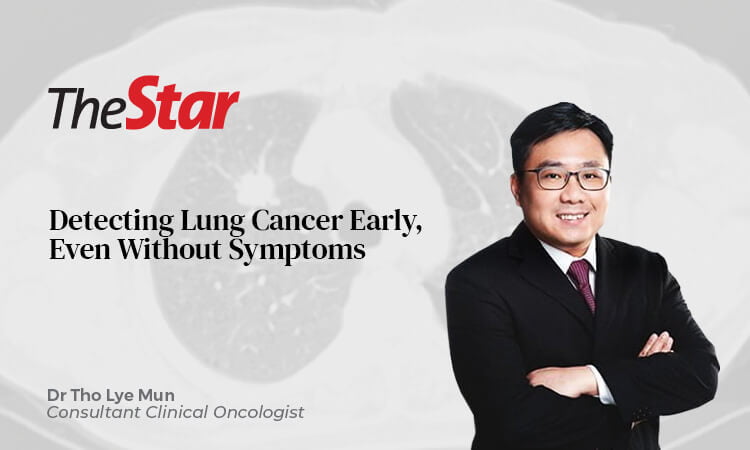Sunday, 27 Nov 2022
Dr Tho Lye Mun & Dr Anand Sachithanandan
When it comes to lung cancer, there is a common misconception that it can only affect those who are older or with a history of smoking, but the reality is that a non-smoker can be diagnosed with lung cancer too.
While smoking remains the most common cause of lung cancer in Malaysia, the number of non-smokers diagnosed with this cancer has been rising in recent years.
“Up to a third of the patients we see with confirmed lung cancer are non-smokers or never smokers,” says consultant cardiothoracic surgeon and Lung Cancer Network Malaysia (LCNM) president Dr Anand Sachithanandan.
For senior consultant clinical oncologist and LCNM vice-president Dr Tho Lye Mun, half his lung cancer patients are non- or very light smokers, and surprisingly, most of them are women.
A person is also at risk if the family history has a predisposition to lung cancer and this seems to be backed by a clinical trial conducted in Taiwan between February 2015 and July 2019.
And then there are the risk factors such as exposure to second-hand smoke and to asbestos added Dr Tho.
In fact, data and studies from World Health Organization (WHO), the International Agency for Research on Cancer (IARC), and the renowned Francis Crick Institute in the United Kingdom suggest that air pollution is so harmful that it can potentially cause inflammation that predisposes to lung cancer.
Dr Anand notes that air pollution may trigger an inflammatory response at a cellular level that may “activate” pre-existing dormant cancer genes or driver mutations (e.g. EGFR and KRAS) leaving never-smokers susceptible to lung cancer.
This would account for the rising incidence of lung cancer detected in young people and non-smokers in polluted urban cities.
According to Dr Tho – “over 90% of the lung cancer patients that he has encountered – presented in stages III and IV – stage IV lung cancer is considered incurable.
The reason for the late diagnosis is because the symptoms of lung cancer can be difficult to spot as it is vague or non-specific, and taken for granted.”
Other less obvious lung cancer symptoms include coughing, pain in the chest, weight loss, the production of blood while coughing, and shortness of breath, among others.
It is possible that lung cancer can be detected early, even before symptoms start, Dr Tho says: “There are available screenings that use a low-dose computed tomography (LDCT) scan, and with early detection, lung cancer can be cured.”
Unlike the traditional CT scan, the LDCT scan is “quick, painless, does not involve needles, and has lower radiation”.
He adds that the LDCT scan the lung very quickly and provides high-quality detailed images minus the hassles of conventional scan that requires fasting and blood test. He would recommend it for men and women aged between 45 to 75 years old who have been smoking for 20 years or more.
Meanwhile, there is an artificial intelligence (AI) screening program that helps to detect early-stage lung cancer.
Once the AI software detects something unusual on the X-ray, the patient is referred to a hospital for a more detailed LDCT scan. And if the patient is confirmed with early-stage lung cancer, they can proceed to early treatment.
Many people assume or share a common misconception that getting diagnosed with lung cancer is akin to receiving a death sentence, but to Dr Tho, this was in the past, now with advancements in the treatment of lung cancer such as immunotherapy and oral targeted therapies, things are changing.
With precision diagnostics and bespoke personalised therapies, even stage IV patients can possibly survive more than five years with a reasonably good quality of life.”
The doctors then shared the story of a 30-year-old lady, who had no history of smoking or cancer in her family, but upon a routine health screening, she was diagnosed with early-stage IV lung cancer.
According to Dr Tho, the medical team did a genetic test and found that her tumor could be targeted by oral targeted therapy. After the therapy, the tumor was then completely removed. Now the patient is living cancer free for the past 5 years and owes much to the early detection done.
In conjunction with the New Normal, Same Cancer public service campaign by LCNM, the National Cancer Society of Malaysia (NCSM) and Pink Unity, supported by AstraZeneca, vouchers for a discounted LDCT scan (including doctor’s consultation) to screen for lung cancer can be downloaded here. They can be used at over 20 participating private hospitals across the country.











